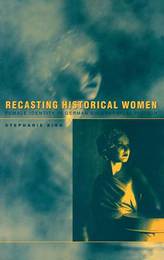
|
Recasting Historical Women: Female Identity in German Biographical Fiction
Hardback
Main Details
| Title |
Recasting Historical Women: Female Identity in German Biographical Fiction
|
| Authors and Contributors |
By (author) Dr Stephanie Bird
|
| Physical Properties |
| Format:Hardback | | Pages:224 | | Dimensions(mm): Height 234,Width 156 |
|
| Category/Genre | Literary studies - from c 1900 -
Literary studies - fiction, novelists and prose writers |
|---|
| ISBN/Barcode |
9781859739624
|
| Classifications | Dewey:833.0099287 |
|---|
| Audience | | General | | Professional & Vocational | |
|---|
| Illustrations |
bibliography, index
|
|
Publishing Details |
| Publisher |
Bloomsbury Publishing PLC
|
| Imprint |
Berg Publishers
|
| Publication Date |
1 April 1998 |
| Publication Country |
United Kingdom
|
Description
This book presents critical readings of eight contemporary German novels which feature historically documented women as their main protagonist, and which reconstruct women's lives by combining source material and invention. Protagonists include Cornelia Goethe, Caroline Schlegel-Schelling, Karoline von Guenderrode and Charlotte Corday. Through a thorough examination of these novels, the wider complexities of female identity, feminism, literary technique and historiography are illuminated and discussed. The author examines how historical events are used to substantiate ideological positions and how the narrators consider this problematic aspect of their project.
Author Biography
Stephanie Bird University College London
Reviews'(a) fruitful and complex examination of specific women... [...](Bird) offers intriguing presentations of the contexts in which these historical women functioned - versus contemporary historical settings - and gives attention to gender issues and to the functions of famous figures like Goethe in each relevant text. Extended quotations in German, good scholarly apparatus, an extensive bibliography, and copious references to lesser-known texts make this an excellent volume for upper-level undergraduates through faculty and interested specialists.' Choice 'The merit of Bird's approach is that, while ever alert to their weaknesses and limitations, she engages with the texts on their own terms, allowing for differences between them and refraining from pressing them into the service of an overarching theoretical construct.' Modern Language Review
|